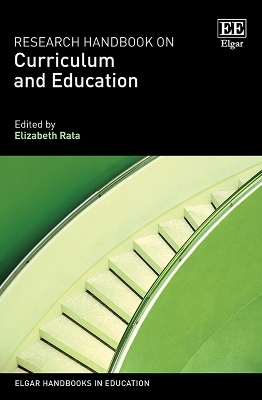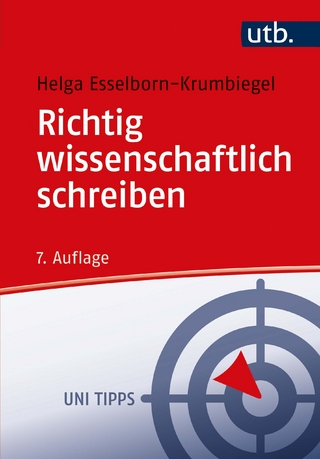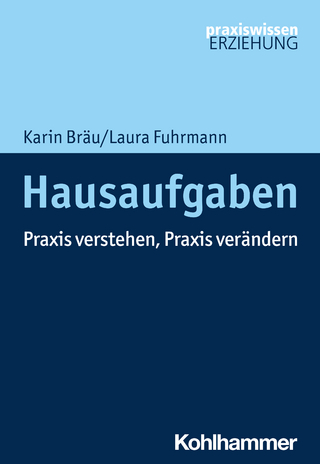
Research Handbook on Curriculum and Education
Edward Elgar Publishing Ltd (Verlag)
978-1-80220-853-5 (ISBN)
Providing a comprehensive account of curriculum history, philosophy, and recent theoretical developments, the Handbook explores timely debates concerning the national curriculum in countries across Asia, Australasia, Eastern and Western Europe, countries in the American continents such as Brazil and Canada. Chapters delve into the relationship between curriculum and democracy, focusing on specific school subjects to examine what the recontextualisation of rational knowledge means for subject selection and design. Opening up a three-way conversation between Didaktik theory, social realism, and cognitive psychology, the Research Handbook puts forward a novel and powerful research programme in curriculum studies.
This innovative Handbook will be an indispensable resource for academics and postgraduate students of curriculum studies, education policy, and education management. Its discussion of new generative research programmes will also benefit education policy makers and analysts.
Edited by Elizabeth Rata, Professor, School of Critical Studies in Education, Faculty of Education and Social Work, University of Auckland, New Zealand
Contents
Introduction: social realism, didaktik, and cognitive science in curriculum and
education 1
Elizabeth Rata
PART I CURRICULUM: HISTORY, PHILOSOPHY, AND THEORY
1 Education for science and democracy 21
Michael Johnston, James Kierstead, and Baptiste Roucau
2 Politics, knowledge, and education in Classical Athens 39
Stavros Moutsios
3 Historical consciousness and democracy 50
Arie Wilschut
4 A philosophical defence of liberal education 64
Alka Sehgal Cuthbert
5 Rob Moore, social realism, and the sociology of education and knowledge 79
Brian Barrett
6 Epistemic traces and the structures of knowledge 90
Johan Muller
7 Disciplines and subjects 101
Jim Hordern
8 Tradition and renewal in the geography curriculum 112
Alex Standish
9 Beyond curriculum binaries: subjects and competencies 129
Ursula Hoadley
10 Cognitive theory: implications for curriculum knowledge 146
David C. Geary
11 Cognitive load theory and the curriculum 156
John Sweller
PART II KNOWLEDGE STRUCTURES AND THE CURRICULUM
12 Significance of teaching content 169
Ilmi Willbergh
13 History education in primary school: knowledge and traditions 180
Martin Stolare
14 From discipline to school subject: a biology example 192
Niklas Gericke
15 Teaching science epistemology 206
Edit McIntosh and Michael Johnston
16 Teaching writing conventions 228
Tessa Daffern
17 Vocabulary for academic literacy 245
Clarence Green and Claire McLachlan
18 The Curriculum Design Coherence Model 262
Elizabeth Rata
19 Teacher education and the curriculum 281
Richard Pountney and Diane Swift
20 Professional knowledge for mathematics teaching 293
Brian Hudson
21 Signature pedagogies for pedagogical leadership 303
Wu Pinhui Sandra and Charlene Tan
PART III CURRICULUM SUBJECTS FOR TEACHING
22 Literature for education 315
Brian Boyd
23 Politicised literacy in the teaching of reading and writing 330
Melissa Derby
24 Music and the contested nature of knowledge 343
Graham McPhail
25 History in the curriculum 354
Joseph Smith
26 A compulsory history curriculum: the New Zealand case 368
Paul Moon
27 Teaching mathematics: a cognitive load theory account 379
Greg Ashman
28 Grammar and powerful knowledge in school English: an Australian perspective 389
Mary Macken-Horarik
29 Knowledge in vocational education 406
Gavin Moodie
PART IV NATIONAL CURRICULUM
30 Theoretical knowledge in the Brazilian school curriculum 422
Newton Duarte
31 Teachers and school subjects in Finland 433
Mikko Puustinen
32 Czechia: beyond the communist-democratic dichotomy 444
Michaela Dvoř‡kov‡ and Dominik Dvoř‡k
33 Georgia: transformation of the national curriculum 455
Revaz Tabatadze and Dominik Dvoř‡k
34 Political education in a pluralistic society: the India example 468
Prakash Iyer
35 Core socialist values and curriculum policy in China 480
Xiaoming Tian
36 Struggles over knowledge after apartheid in South Africa 495
Jonathan Jansen
37 Secularism and education in New Zealand 509
Roger Openshaw
38 Land-based education in Canada 521
Frances Widdowson
39 The Singapore mathematics curriculum: influences and confluences 536
Ban Heng Choy and Jaguthsing Dindyal
40 Knowledge in the new Norwegian curriculum 552
Erik Bratland
| Erscheinungsdatum | 17.04.2024 |
|---|---|
| Reihe/Serie | Elgar Handbooks in Education |
| Verlagsort | Cheltenham |
| Sprache | englisch |
| Maße | 169 x 244 mm |
| Themenwelt | Sozialwissenschaften ► Pädagogik |
| ISBN-10 | 1-80220-853-4 / 1802208534 |
| ISBN-13 | 978-1-80220-853-5 / 9781802208535 |
| Zustand | Neuware |
| Haben Sie eine Frage zum Produkt? |
aus dem Bereich


